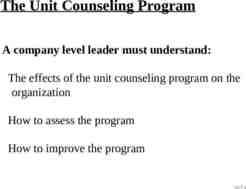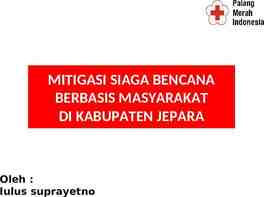BLENDED TRAINING PROGRAM FOR FOOD AND BEVERAGE SERVICES NC II OF
14 Slides735.95 KB

BLENDED TRAINING PROGRAM FOR FOOD AND BEVERAGE SERVICES NC II OF TESDA WOMEN’S CENTER TECHNICAL EDUCATION AND SKILLS DEVELOPMENT AUTHORITY TESDA WOMEN’S CENTER

BACKGROUND In 2015, the TESDA Women’s Center conducted a pilot test of the Blended Training with a number of selected trainees of the Food and Beverage Services NC II course. Three (3) online courses related to FBS were pilot tested, namely: Room Attendant Servicing; Busboy Servicing; and Waiter Servicing. These corresponds to the 3 core competencies of the Full qualification, namely: “Provide room service” “Provide link between kitchen and service area” and “Provide food and beverage service” in FBS NC II, respectively.

OBJECTIVES To test and evaluate the developed e-learning modules of FBS in terms of acceptability and readiness of target learners to online learning; To determine if online learning is at least equivalent to learning using traditional face-to-face instruction; To measure the achievement of the trainees’ learning outcomes; and To determine the areas for improvement of the developed elearning materials.

STEPS 1. The trainees are guided by the training schedule provided by the trainer for the completion of the required modules for the blended training. All the modules without available e-learning materials shall be completed using the traditional method (face-to-face) of training delivery including the “Supervised Work-based Training”.

STEPS 2. The trainees are given orientation on the following: Overview Training of the Blended Training Program; Plan and Schedule; Orientation on the “How to Register/Enroll” in the Full Online Program; and House Rules on the Use of e-TESDA facility. 3. The trainees are to register in the TESDA Online Program at etesda.gov.ph.

STEPS 4. The trainees used the e-TESDA facility at the TWC for their online training. The TWC’s e-TESDA facility are available for the trainees’ use from 8:00 am to 5:00 pm on weekdays only. They are required to log in at the attendance sheet. 5. The e-TESDA office monitors and coordinates with concerned TWC trainer re the frequency and duration of the trainees’ logs on the online program.

STEPS 6. During the online training, the trainees are not allowed to use the TWC training laboratories for practicing the core competencies. There will be very limited interaction between the trainer and trainees during the online phase, however, the trainees can course their questions or clarifications through the e-TESDA LMS or they can send email to the concerned trainer.

STEPS 8. Each trainee is given the Trainee’s Record Book (TRB) to document their learning progress. 9. The trainees shall request schedule from the trainer for institutional assessment to be done at the TWC training laboratory after completion of each competency completed thru online. The trainees can be allowed to proceed to the next module after passing the institutional competency assessment.

STEPS 10. Trainees who are found not yet competent after the assessment will be allowed to review the modules online and can be given two (2) more chances until they pass the assessment. If in the event that a trainee could still not pass the competency assessment after the third attempt, the trainee will undergo evaluation and counseling to determine the cause of poor performance. If the cause of poor performance is difficulty in coping with the online program, the trainee can be advised to continue the training using the traditional method of training delivery (face-to-face).

STEPS 11. The TWC trainers involved in the pilot testing monitor closely the performance of trainees and document the progress of their knowledge, skills and attitudes during online learning. 12. Achievement of the learning outcomes per module are measured using written test, demonstration and oral questioning. 13. An overall program evaluation is conducted upon completion of training to determine the effectiveness of using the blended learning approach.

BLENDED TRAINING PROGRAM FLOW Core Basic Competency Competencies(Fa Competencies Assessment(F ce-to-Face/Online (Face-to-Face) ace-to-Face) ) Su pe rvi se W or kba se d Tr ai ni ng (O JT )

RESULTS The results showed that (a) there was a significant difference in the training duration of Blended FBS NC II compared with the regular FBS NC II under the Competency-Based Training (CBT) program; (b) all trainees in the experimental group obtained National Assessment. Competent Rating in the Overall, the graduates of the Blended FBS Training Program were certified as Competent in the National Assessment even if they spent 213 hours or 26.6 days only to complete their training compared to 472 hours or 3 months nominal duration of the regular FBS NC II.

STATUS There are 22 trainees currently enrolled in the Blended training program of FBS NC II and is scheduled for National Competency Assessment before the end of September Since 2015, 340 trainees graduated and were certified with National Certificate (100% certification rate) for Food and Beverage Services NC II under the Blended Training Program with 63% annual employment rate.

CHALLENGES Internet access of trainees Computer Some Literacy trainees would opt to be trained the traditional Competency Based Training methodology (according to trainees’ feedback) because they are more comfortable reading modules and would like to avoid eye strain due to long period of browsing the internet.






